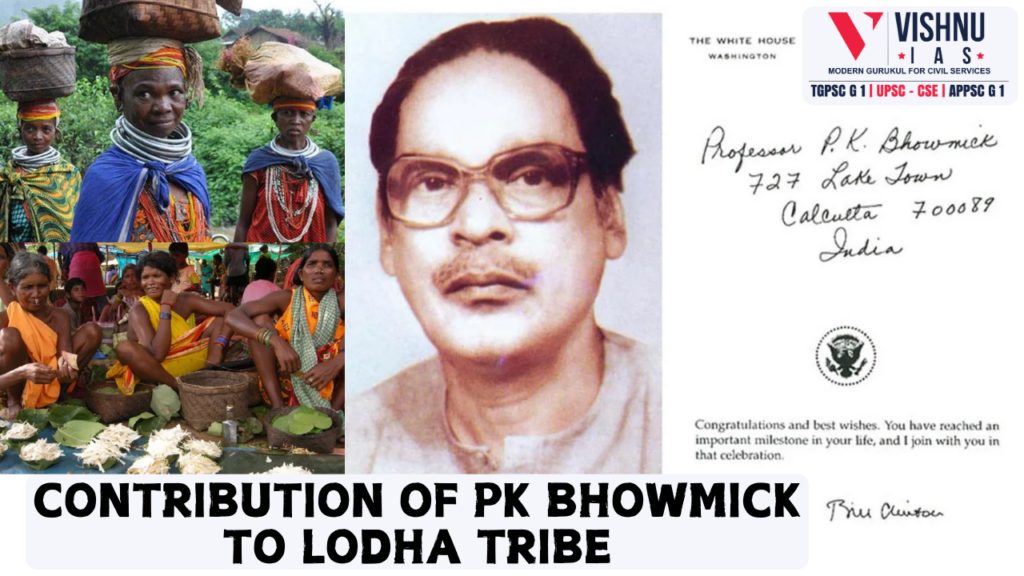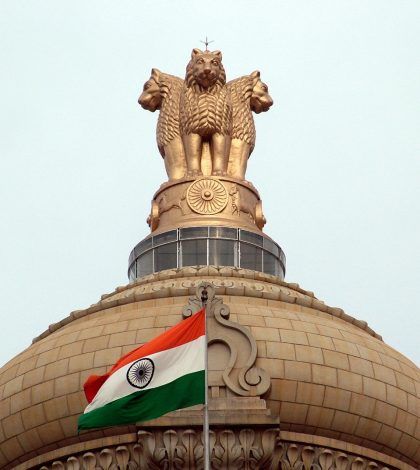Contribution of PK Bhowmick to Lodha Tribe
Approach
- Introduction: Brief note on the contribution of P.K. Bhowmick
- Body: add comprehensive analysis about the contribution of P.K. Bhowmick in decriminalising the status of the Lodha tribe.
- Conclusion: Conclude through his contributions.
INTRODUCTION
Prabodh Kumar Bhowmick was a renowned Indian anthropologist whose work significantly contributed to the decriminalization and upliftment of the Lodha tribe in West Bengal. The Lodha tribe was historically classified as a “criminal tribe” under British colonial rule, a designation that stigmatized and marginalized them for decades.
BODY
Bhowmick’s efforts were instrumental in challenging this label and advocating for the rights and rehabilitation of the Lodha community.
Historical Context
The British colonial administration in India categorized certain tribes as “criminal tribes” under the Criminal Tribes Act of 1871. This act labelled entire communities as inherently criminal, leading to widespread discrimination and social ostracism. The Lodha tribe was one such community affected by this legislation.
Bhowmick’s Fieldwork and Advocacy
P.K. Bhowmick’s engagement with the Lodha tribe began in the mid-20th century. His approach combined rigorous ethnographic research with active social work.
Key aspects of his contribution include:
- Ethnographic Research:Bhowmick conducted extensive fieldwork among the Lodha tribe, documenting their social structures, cultural practices, and the impact of the “criminal tribe” label on their lives. His research provided a detailed understanding of the community, challenging the stereotypes and misconceptions perpetuated by colonial authorities.
- Bidisa Project:Bhowmick established the Bidisa Project, an experimental research center aimed at the socio-economic development of the Lodha community. This project served as a “natural laboratory” where he demonstrated that the Lodhas were not inherently criminal but were victims of systemic marginalization.
- Advocacy for Decriminalization:Bhowmick’s findings and advocacy played a crucial role in the movement to decriminalize the Lodha tribe. He provided irrefutable evidence that the criminal label was unjust and based on colonial prejudices. His work contributed to the repeal of the Criminal Tribes Act and the subsequent denotification of the Lodha tribe.
- Educational and Economic Initiatives:Through the Bidisa Project and other initiatives, Bhowmick focused on improving the educational and economic conditions of the Lodha community. He emphasized the importance of education, vocational training, and economic self-sufficiency as means to uplift the community.
Impact and Legacy
Bhowmick’s efforts had a profound impact on the Lodha tribe and the broader field of anthropology in India. His work not only contributed to the decriminalization of the Lodha tribe but also highlighted the importance of applied anthropology in addressing social injustices. Key outcomes of his work include:
- Decriminalization:The Lodha tribe was officially DE notified as a criminal tribe, removing the legal stigma that had long oppressed them.
- Improved Socio-Economic Conditions:Bhowmick’s initiatives helped improve the socio-economic conditions of the Lodha community, providing them with better opportunities for education and employment.
- Anthropological Contributions:Bhowmick’s work set a precedent for anthropologists to engage in applied research that directly benefits marginalized communities. His approach demonstrated the potential of anthropology to drive social change.
CONCLUSION
Prabodh Kumar Bhowmick’s contributions to the decriminalization and upliftment of the Lodha tribe are a testament to the power of dedicated research and advocacy. His work not only transformed the lives of the Lodha community but also enriched the field of anthropology by emphasizing the importance of applied, socially engaged research.
Anthropology Full Course at Vishnu IAS Academy
What does Course Offer?
- 4 Months (250+ Class Hours)
- Online (App + Web) / Offline / Hybrid Mode of Classes
- Live + Recorded Videos Access For 1 Year
- 2 Hour Live Class From Monday to Saturday (1.5 Hours for Class + ½ Hour for Doubt Solving)
- Foundation to Advanced Level of Teaching
- Simple and Integrated Content
- One Stop Solution Books
- Regular Value Added Content
- Current Affairs & Case Studies Modules
- Daily Answer Writing Practice
- Weekly Grand Tests On Sundays & Evaluation With Guidance and Topper Will be Rewarded
- 500+ Model Answers
- 9 AM – 9 PM Support System
- Free GS Current Affairs
- Free Interview Guidance for Anthropology


